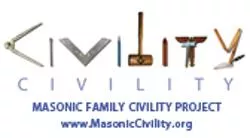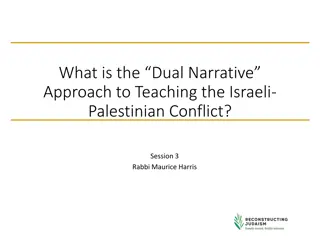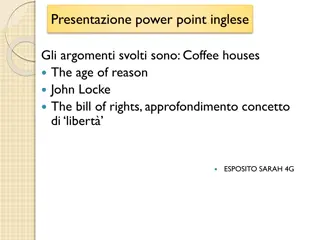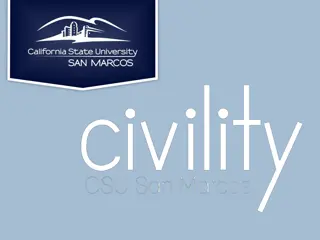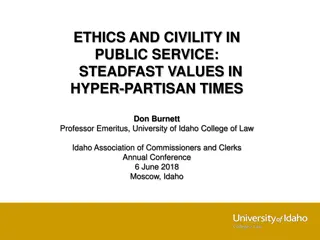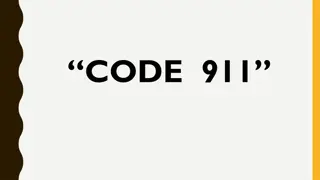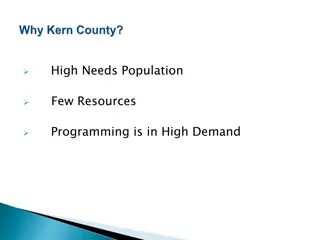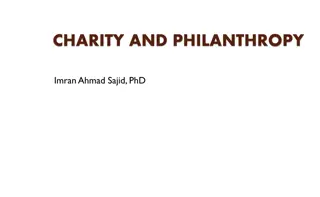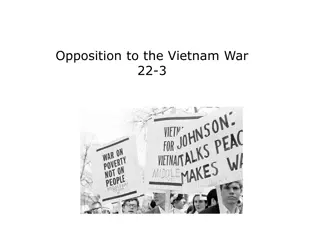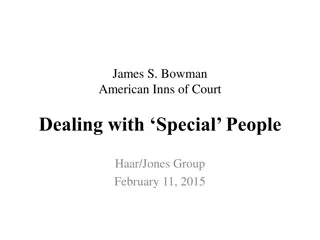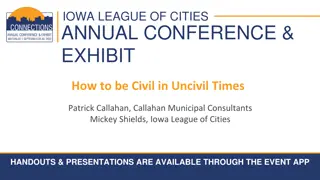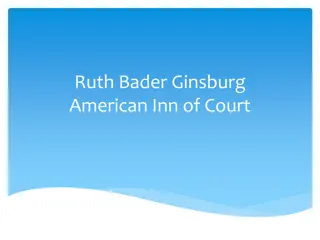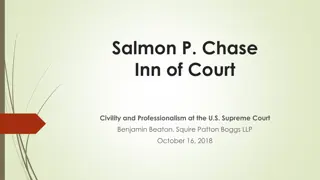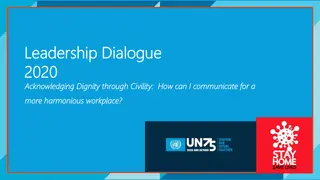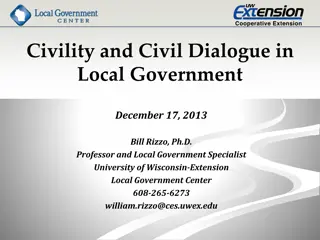Importance of Civility in Society: A Closer Look
Civility plays a crucial role in the success and well-being of society. Grounded in respect and inclusiveness, practicing civility reminds us of the impact of our actions on others. Explore the significance of civility, its definitions, societal concerns, and the need for greater awareness in our interactions.
Download Presentation

Please find below an Image/Link to download the presentation.
The content on the website is provided AS IS for your information and personal use only. It may not be sold, licensed, or shared on other websites without obtaining consent from the author.If you encounter any issues during the download, it is possible that the publisher has removed the file from their server.
You are allowed to download the files provided on this website for personal or commercial use, subject to the condition that they are used lawfully. All files are the property of their respective owners.
The content on the website is provided AS IS for your information and personal use only. It may not be sold, licensed, or shared on other websites without obtaining consent from the author.
E N D
Presentation Transcript
Why Civility Matters in the Lodge MASONIC FAMILY CIVILITY PROJECT
What is Civility? Civility is essential for the success of any society. It is grounded in respect and in an attitude of inclusiveness. When we practice civility we remind ourselves about the impact of our actions on others while contributing to the well being of our family, community and society at large. Civility advocates for treating others as you would want them to treat you. We can all define what it is NOT --- How do we define what civility is? It s a journey. It s the embodiment of the Ten Commandments. It s the Golden Rule, applied.
Would You Believe? Wikipedia has long had a definition of incivility but only in the last year or so has a definition of civility been tendered and approved.
Lets Look at the Numbers 81% of Americans think that incivility is leading to an increase in violence.
70% of Americans believe incivility has reached crisis proportions. With Americans encountering incivility an average of 2.4 times a day. Source- Civility in America: A Nationwide Survey, conducted by global public relations firm Weber Shandwick and public affairs firm Powell Tate in partnership with KRC Research
Civility Survey Do you believe society is in need of greater civility?
Civility Survey Taking yourself, your family and your community as an example: How often do you witness acts of incivility? .
Thinking about oursociety and communities as a whole How concerned are you about the level of incivility you witness?
Our Future Members and Leaders 92% of teens say they feel social media, e.g., Facebook and Twitter is making us a less civil society.
Why Civility Now? Based on these observations, if incivility was a disease, it would be an epidemic.
With so much acknowledged incivility in the world, why would you allow it to take hold in your lodge?
Why Civility in the Lodge?
Why Civility in the Lodge? Remember the Compass Improves member retention Improves member attendance Improves new member attraction Improves our public image WE can be the force for change
The Compass Image result for masonic compass
Why Does All Of This Matter? Member Retention A recent poll showed that 26 % of people have quit a job because it was an uncivil workplace. If people are willing to leave a job, how many more would be willing to leave a lodge?
Impact on Member Attendance and Attraction Impact on Member Attendance and Attraction Public rudeness among employees is common. Whether it s waiters berating fellow waiters or store clerks criticizing colleagues, disrespectful behavior makes people uncomfortable, and they re quick to walk out without making a purchase. How many brothers are walking out for the last time and how many potential members are never coming back due to incivility?
Increased Increased Distraction from Greater Things Distraction from Greater Things According to a study conducted by Accountemps and reported in Fortune Magazine, managers and executives at Fortune 1,000 firms spend 13% percent of their work time mending employee relationships and otherwise dealing with the aftermath of incivility. How would you rather spend your time, refereeing incivility in the lodge or taking action in your community, welcoming new brothers, and making a difference?
Cost and Consequences of Incivility Cost and Consequences of Incivility to Lodges to Lodges Reduced enthusiasm Declining attendance Dwindling active membership for projects, activities, and service Reduced public awareness or opinion Poor member experience
Stress at work also impacts our relationships Respondents indicated that on average job stress accounted for 73% of their overall life stress. 59% of respondents said that the quality of their home and family life was sometimes impacted by job stress 16% said that job stress frequently impacted their personal and family life. Source: Human Solutions Report, Under Pressure
Do you want your Lodge to be a stress point in anyone s life? With all of the other potential stresses in a person s life, why not make the lodge a refuge; a place of friendship, support, and understanding. This does not mean we need to always agree. It means we need to be able to express our differences in a way that is constructive without being a source of incivility, stress, and contention.
Incivility Contributes to: Reduced officer and lodge efficiency Reduced member morale Less innovation Absenteeism Loss of resources and talent Lower Productivity as a group (Many hands)
Lower Quality Experience for Everyone
Think About This If incivility was present in your lodge, would you invite a friend to come to anything your lodge planned? How about a member of your family? If you experienced incivility, even if it was just a couple of times, would you keep coming back, especially if nobody seemed to care that it was happening?
FIRSTREMEMBER WHO WE ARE MASONIC HERITAGE CULTURAL SENSITIVITY We have a long history of fostering civil dialogue and building civil societies. We are a group of like-minded men but our lodges represent a diverse group of people of different: Places of origin Language Races Ability Knowledge And much more
How Do We Fix It? Be Self-Aware 25% of managers who admitted to having behaved badly said they were uncivil because their leaders their own role models were rude. And, in a survey of 1000 American Executives Michelle McQuaid, a leader in Positive Psychology interventions, found that only 35% of Americans are happy at their jobs. 65% say a better boss would make them happy. And only 35% say a pay raise will do the same thing.
How Do We Fix It? Be Self-Aware Be mindful of how you treat and talk to officers, members, and their families, especially if you are in a leadership role. Remember, none of us HAS to be here. Seek solutions through civil dialogue and understanding. Lead with Brotherly Love
How Do We Fix It? Engender Trust In Edelman s Trust Barometer, where results from 31,000 respondents representing 26 markets around the world were gathered, only 18% of those surveyed trust business leaders to tell the truth. That is just slightly higher than the statistic for trusting government officials, which was only 13%.
Engender Trust Amongst Leaders and Brothers As a leader, be a resource of truth, trust and reliability. Be a positive example to follow, so that those who follow can replicate that good example. Be an inspiration and model of civility. Have projects and programs (Work and Play) away from ceremonial lodge activities that encourage the members to spend more time together. (Bonding through common suffering)
Listen Actively Members will frequently tell you when they are unhappy and why. See this as an opportunity to listen actively, without being defensive, and seek solutions that satisfy both sides. When this is not possible, both sides will need to be active listeners, be willing to see the other person s side, and be willing to accept the circumstance without creating turmoil in the lodge by continuously voicing their disagreement. Attentive Ear
Personally Be Self-Aware Make a commitment to be more civil. Consciously pay attention to your own actions and communication with others. (Take a deep breath) Think the best of others Incivility often arises when we feel we have been intentionally wronged, disregarded, or disrespected. However, such transgressions are usually committed without malice and more from a lack of awareness. Be Self-Actuating Seek out and recognize opportunities to introduce or engage in civil discourse during times of disagreement or outright conflict. Encourage Others In times of calm, gently engage in a conversation about civility awareness (Instructive Tongue)
Consider the Resources Available to You Variety of online resources for individuals, families, lodges, workplaces, and nations Develops useful material with input from more than 4 dozen participants and 20 Grand Lodges We have recruited and trained Ambassadors from countries world-wide CIVILITY TOOLBOX MASONIC CIVILITY TASK FORCE AMBASSADORS AVAILABLE We have developed a Civility Scorecard CIVILITY SCORECARD Social Media Presence -MasonicCivility.org and Facebook Group SOCIAL MEDIA 31 DAY CIVILITY CHALLENGE Take The Challenge
Take the 31 Day Civility Challenge Ambassador Training v.52615
Most people do not make a conscious decision to be uncivil. In fact, being uncivil takes no conscious effort at all. It just happens. Civility, especially in the heat of a moment, takes effort and consideration. But like anything else we do consciously and regularly, Civility, if practiced regularly, will soon become a part of who we are. It will become an unconscious manner of behaving, and will benefit our lodges, our members, and our communities for generations to come. Image result for masonic compass You can be a force for change.
That journey begins in our Lodges and with each of us. MASONIC CIVILITY EFFORT In 2014, Masonic leaders across North America embarked on a journey to address the need for a more civil society.
Visit and use the following resources frequently 1) Civility Task Force Ambassadors available to you and your lodge (Information, Presentations, Conflict Resolution Assistance) 2) Civility Toolbox- AVAILABLE TO ALL MASONS IN NORTH AMERICA http://www.civilityresources.com/Civility-Resources.html 3) Civility Scorecard Scorecard-contact info@MasonicCivility.org or Russ Charvonia at 805-258-1037 4) Take the 31-Day Civility Challenge 5) Visit Our Social Media Outlets Frequently for Updated Material and Insight Masonic Civility website- Masoniccivility.org Facebook Group 6) Support these efforts through The Civility Shop at www.CivilityShop.org
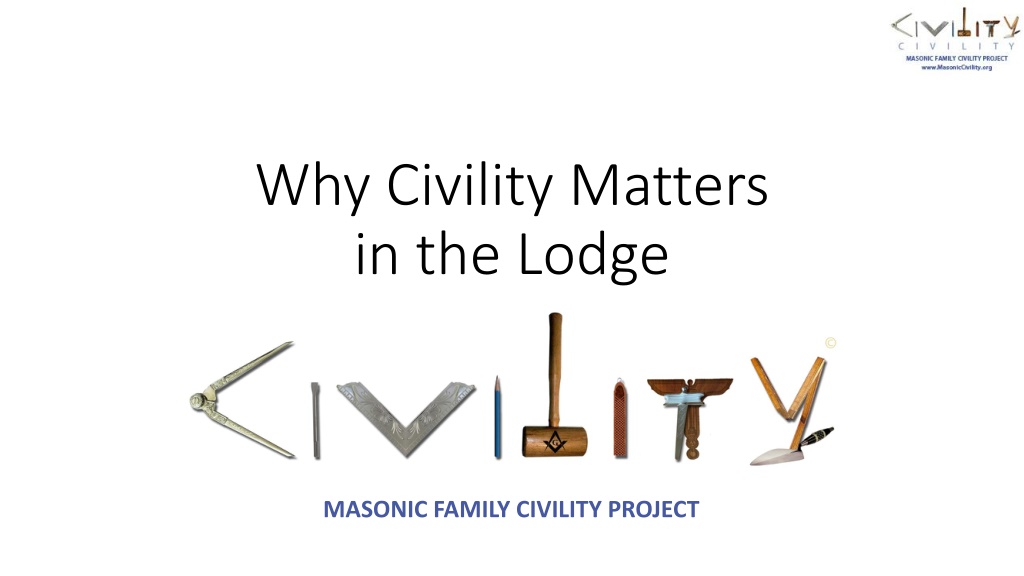



 undefined
undefined


